|
|
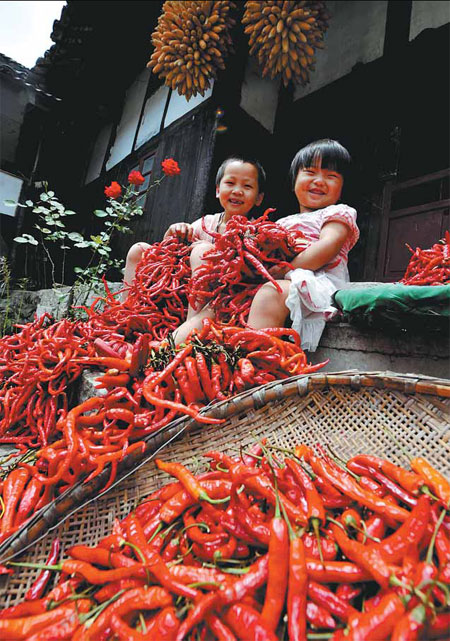
Hot pepper is one of the key agriculture products in Xiuwen county, Guizhou province. Yang Ying / Xinhua
|
|
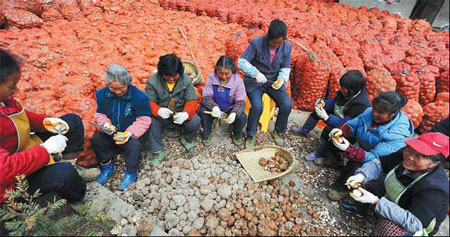
Farmers in Xiuwen county are improving their standard of living by growing konjak, a plant that is considered a health food by many people in Asia. Qiao Qiming / for China Daily
|
|
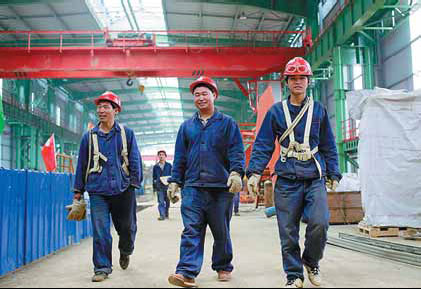
Guiyang Special Steel Co, established in 1958, is currently building a new factory in Xiuwen county. Feng Yongbin / China Daily
|
|
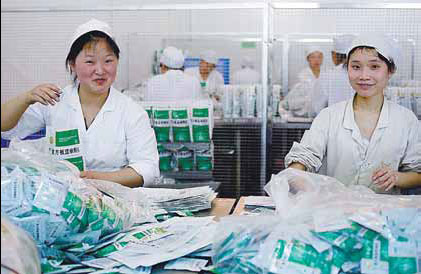
Workers in the packaging department of De Chang Xiang Co, one of the leading producers of traditional Chinese medicine in Guizhou province. Feng Yongbin / China Daily
|
|
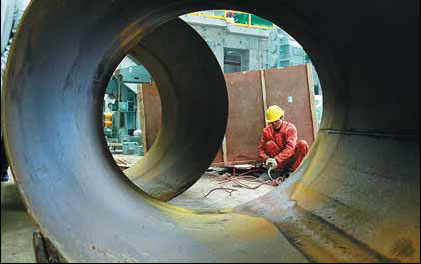
A worker welds a pipe at Guiyang Special Steel Co's new factory in Xiuwen county. Feng Yongbin / China Daily
|
|
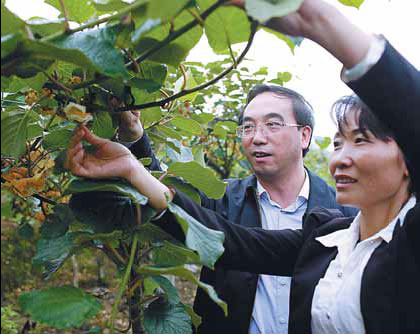
Shi Kaiyan (right) displays her kiwi trees to Jiang Zhilun, the county chief of Xiuwen. Feng Yongbin / China Daily
|
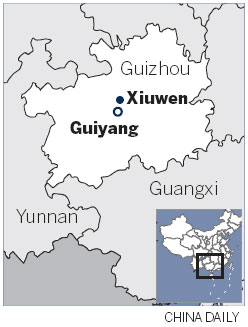
Province makes full use of natural resources, and maintains ecosystem, as Yang Wanli and Yang Jun report in Guiyang.
Italy is famous for many things - pasta, fine wines, stylish clothing, stunning architecture and stylish clothing being just a few.
However, many people are unaware that the country is also the world's largest producer of kiwi fruit, surpassing even New Zealand, the country that the fruit is most often associated with. The small town of Campoverde produces more than 400,000 metric tons of kiwis annually, earning millions of dollars for local farmers.
Thousands of kilometers from Campoverde, in Pingtan, a village in Guizhou province, Shi Kaiyan is busy taking care of her kiwis. Like many farmers in the area around Xiuwen county, the 38-year-old is hoping to emulate the success of her Italian counterparts and improve living standards in this rural community.
To that end, an official from the county's agriculture department said there will be 14,000 hectares of kiwi orchards by 2017, producing 400,000 tons of the fruit every year. Given those figures, output in this little-known backwater will equal that of Campoverde in four years.
Shi, elected village secretary because of her business experience, decided to close her snack bar in 2008 and become the first local resident to try her hand at growing kiwis.
"It's an attractive business, much better than growing rice and vegetables," she said. However, farming is a challenging occupation in Guizhou, where more than 90 percent of cultivatable land is situated in highly mountainous areas. Having taken the step of inviting experts to test the local soil and identify the most suitable crops for the area, she opted for kiwis.
It's now the season for pollination. Shi's roughly 1.3 hectares of orchards are swarming with dozens of workers at this time of year. Butterflies and bees are rarely seen on the farm, despite the profusion of kiwi flowers in full bloom. Flowers of the small, furry-skinned fruit have almost no fragrance, meaning the usual agents of pollination ignore them. Artificial pollination is a necessity and two rounds of fertilization every year require plenty of hands on deck.
Each worker is paid 80 yuan ($13) per day, which is not a bad wage in a province where most farm laborers earn just $814 a year on average.
"Most of them are from border counties," said Shi, who can earn as much as $32,500 a year from her fruit enterprise.
Transformation
Almost all of the 400 families in Pingtan village are growing kiwi fruit nowadays. A family can earn $8,000 to $9,000 a year, compared with the per capita average annual income of 4,800 yuan in Guizhou's rural areas, according to statistics compiled by the local government in 2012. Growing kiwis is a great business, not only for Shi, but also for the other 250,000 farmers in Xiuwen county.
"Choosing the right business is really important, especially for farmers in Guizhou," said Shi. A lack of farming knowledge and experience meant that most villagers, who have little formal education, could only cultivate the most basic crops in the past. "Many families couldn't even feed themselves," she said.
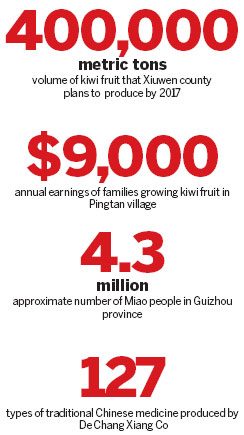
The region's geography, weather and the local ecosystem have combined to create a garden-like environment in Guizhou. Thanks to the 40 percent forest coverage in the province, the capital city, Guiyang has an average temperature of 17 C all year round and the level of airborne PM 2.5, or fine particulate matter, is usually between 40 to 60 micrograms per cubic meter, a range that indicates some of the cleanest air in China.
However, the downside is that the mountainous nature of the area makes transport difficult and that has resulted in related problems, such as a poor general level of education, lower average incomes and slow economic growth.
However, Guizhou is fighting back to make full use of its rich natural resources and to maintain the ecosystem. The results of this policy are becoming evident in Guiyang, which has been working toward industrial transformation and environmental protection for several years.
Xiuwen county is a reflection of the changes in Guiyang. Apart from helping local farmers to better utilize the area's natural resources, the county government has also given support to exploration of the market for herbs and the traditional medicines produced by the Miao ethnic group.
The perfect environment
As home to around 4.3 million Miao people - around half the total population - Guizhou has the advantage of using the Miao's unique formulas. De Chang Xiang Co, established in 1900, is one of the leading producers of traditional Chinese medicines in the province.
Driving from Guiyang's downtown area to the De Chang Xiang factory, the thick jungle and quiet forests make it hard to pinpoint the company's location until a strong fragrance of herbs fills the nostrils. A road sign alerts travelers to the fact that they have just arrived in Xiuwen county in the northern part of Guiyang.
"Humidity here is about 70 percent all year round and the temperature is moderate. These two factors have produced the perfect environment for growing herbs," said Wang Xun, a pharmaceutical engineer at the company who has been researching traditional Chinese medicine for 15 years.
De Chang Xiang produces 127 types of traditional Chinese medicine, 15 of which employ unique formulas. In addition to treatment for common ailments, such as colds, the company also produces herbs that complement chemotherapy. One of the special Miao formula drugs for the condition is among China's top 10 of its type in terms of sales.
"Chemotherapy drugs are used to improve the patient's immunity levels and increase the number of white blood cells. Most of these drugs are Western, but Chinese patients prefer herbal medicines because they have fewer side-effects," said Wang.
The company's best-selling drug is used in the treatment of gynecological ailments such as extreme period pain. Wang displayed a red and yellow paper box containing 160 pea-sized traditional Chinese medicine pills made from about 40 different herbs. The treatment earns the company around $49 million a year.
"Other Miao formulas also enjoy a good reputation in the markets of China and Southeast Asia, especially drugs that improve kidney function and strengthen the bones," said Wang.
Circular economy
To minimize pollution and waste, the company processes the herb residue for use as a fertilizer. "We follow a circular economy that has been promoted by the local government for many years. Guizhou has a great number of natural resources and we have to make good use of them, while also maintaining sustainable development," he said.
Ideas such as this are crucial to the construction of modern cities in China. To better protect the local environment and prove worthy of the logo "Cool Guiyang", the municipal government undertook an important move in 2009, when the largest steel manufacturer was moved from the city center to Xiuwen county.
With a total investment of $2 billion, Guiyang Special Steel Co, established in 1958, is now building a new factory in Xiuwen. The facility, which will be fully operational by the end of 2014, will produce 1.5 million tons of special steels annually, mainly for use in military and high-tech equipment.
Wan Rongguang, the company's technical adviser, said that about 10 percent of the overall investment will be used in energy conservation and environmental protection. However, the green side of the business will also be a money-spinner. For example, solid waste will be processed into cement at a cost of 100 yuan per ton, and will retail at around 400 yuan per ton.
"We will also cooperate with a US company and use its technology to process solid waste into chemical fertilizer. It will create greater added value," he said. The company will also spend approximately $98 million on a new sewage system and a plant to recycle waste gas.
Unlike most heavy industry factories that are usually characterized by countless high-voltage cables and related electrical equipment, these will all be hidden underground. A massive subterranean system of tunnels is currently under construction that will house high-voltage fiber-optic cables and reduce exposure to electricity.
The relocation of Guiyang Special Steel has been doubly positive. It not only ensures a better environment in Guiyang city center, but also provides employment opportunities for Xiuwen residents.
The company is among a number of large-scale enterprises that have, or are planning to, site their factories in Xiuwen's industrial park, which covers 50 square kilometers. Local authorities estimate that roughly 15,000 jobs will be available at the park when construction is completed at the end of 2020.
Relocation
For Lei Hongmei, 24, whose family was moved to a new residential area when construction began on the industrial park, relocation not only provides much better living conditions, but also great business opportunities.
Lei's family lived in Xiaobao village for more than 60 years, but in 2009, when construction began on the industrial park, the local government built the Pearl River residential area to house relocated families.
Each family in the village was given one or two apartments the same area as their previous homes. With a park, an outdoor exercise area, service centers and a supermarket, Pearl River is almost indistinguishable from modern residential areas in metropolises such as Beijing and Shanghai. Even better for the residents, the new homes were provided gratis.
"Most villagers used to live in adobe houses, some of which had no toilet or shower room," said Lei, who added that her parents have appreciated the move. "As they get older, they need to visit the bathroom more frequently in the evenings and that was really inconvenient in our old home."
Lei said about 30 of her relatives from Xiaobao, which has a population of around 2,800, have now moved to the Pearl River complex. In addition to being given new homes, the villagers were also compensated for the move: "Some of the families still have farming land in the villages, while others used their compensation to open small businesses," Lei said.
The local government provides free technical training courses for the younger and middle-aged villagers, focusing on the sort of work that will be available in the industrial park when construction is completed in 2020.
Lei has a strong sense of how to run a business. House decorations are in great demand as a result of the relocation of the village and, sensing an opportunity, she opened a lighting shop in Pearl River, selling European-style crystal chandeliers. A chandelier with a diameter of 60 centimeters sells for about 1,000 yuan, and Lei earns around 60,000 yuan annually from the business.
"I think the relocation of our village is what the government calls urbanization. It has improved the standard of living in the rural areas. More importantly, even though we are no longer farmers, we have other opportunities to make a living using our own abilities and the recently acquired skills, which really makes us the same as urban residents," she said.
Contact the writer at yangwanli@chinadaily.com.cn
|